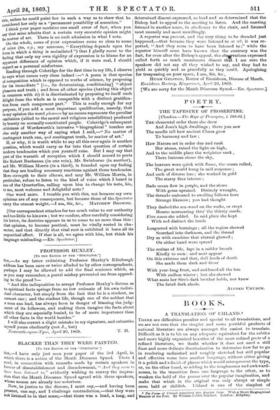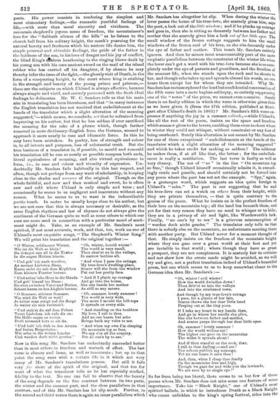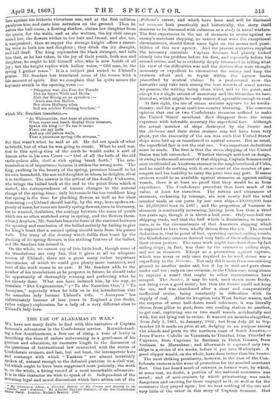BOOKS.
A TRANSLATION OF UHLAND.*
Titanic are difficulties peculiar and special to all translations, and we are not sure that the simpler and more youthful products of national literature are always amongst the easiest to translate. Difficult as it is to hit on any adequate equivalent for the subtler and more highly organized beauties of the most refined poets of a refined literature, we doubt whether it does not need a still finer and more delicate discrimination to determine how far to go in rendering unfinished and roughly sketched but still popular and effective verse into another language, without either giving It a polish and a finish of phrase which would misrepresent the type, or, on the other hand, so adding to the roughness'.% and awkwardnoises, in the transition from one language to the other, as to weaken the hold of the poems over the popular imagination, and make that which in the original was only abrupt or simple seem bald or childish. Uhland is one of the simplest of
poets. His power consists in rendering the simplest and most elementary feelings,—the romantic youthful feelings of life,—with more than usual sincerity and vividness. The mountain shepherd's joyous sense of freedom, the mountaineer's love for the "Sabbath silence of the hills" as he listens to the church bell from his solitary height, the monk's yearning for the natural beauty and freshness which his austere life denies him, the simple paternal and chivalric feelings, the pride of the father in the boldness of the son, in his love of danger and his joy of conflict, the blind King's atxious hearkening to the ringing blows dealt by his young son with his own ancient sword on the mail of the island robber who has carried off his daughter, if by chance he may thereby infer the issue of the fight,—the ghostlyvisit of Death, in the form of a conquering knight, to the court whose king is exulting in the strength and beauty of the young prince and princess,— these are the subjects on which Uhland is always effective, because always simple and vivid, and entirely possessed with the fresh ideal feelings he delineates. Mr. 1V. C. Sandars tells us that his main aim in translating has been literalness, and that "in many instances the English translation has not received that embellishment at the hands of the translator which a slight alteration of the meaning suggested,"—which means, we conclude, not that he refrained from improving on his author, but that he has seldom if ever sacrificed the meaning for the sake of a phrase which, though farther removed in mere dictionary-English from the German, seemed to approach it more nearly in ease and idiomatic force. In this he may have been mistaken. In poetry, loss of strength and colour is, to all intents and purposes, loss of substantial truth. But the true business of a translator is, if possible, to mould and remould hie translation till he can as nearly as possible compass both ends, literal equivalence of meaning, and also virtual equivalence in form, i.e., in ease and colour and vivacity of expression. Undoubtedly Mr. Saudars fails habitually in this last respect, and often, though not perhaps from any want of scholarship, in keeping close to the shades and nuances of the original. Though on the whole faithful, and now and then musical and sweet, he is often raw and cold where Uhland is only simple and terse ; and occasionally he seems to us negligent and inaccurate without any reason. What he seems to us to want is the indescribable poetic touch. In metre he usually keeps close to his author, but we are not sure that this is always necessary or desirable, as the same English rhythms and law of rhymes do not always give the sentiment of the German quite so well as some others to which our ears are more used in connection with a particular mood of sentiment might do. Take, as an example of Mr. Sandars's most spirited, if not most accurate, work, and that, too, work on one of Uhland's most exquisite songs, "The Shepherd's Winter Song." We will print his translation and the original together :— Now in this song Mr. Sandars has undoubtedly succeeded better than in most others in freedom and warmth of effect. The last verse is clumsy and lame, as well as inaccurate ; but up to that point the song runs with a certain life in it which not very many of Mr. Sandars's translations possess. But still it falls very juir short of the spirit of the original, and that too for want of what the translator tells us he has especially studied, fidelity to the text. No one can fail to observe that the beauty of the song depends on the fine contrast between its two parts, the winter and the summer part, and the close parallelism in that contrast, and of this Mr. Sandars has let slip much. Further, in the second and third verses there is again an inner parallelism which
Mr. Sandara has altogether let slip. When during the winter the lover passes the house of his true-love, she scarcely gives him, says the poet, a look out of the little window; and if he plucks up courage and goes in, then she is sitting so demurely between her father and mother that she scarcely gives him a look out of her little eyes. The small window of the frozen cottage suggests to him the small windows of the frozen soul of his love, as she sits demurely under the eye of father and mother. This touch Mr. Sandars entirely ignores. And then he misses most unaccountably part of the more emphatic parallelism between the constraint of the winter life when the lover can't get a word with his true-love because she is so completely under the eye of parents and guardians, and the freedom of the summer life, when she stands upon the rock and he shouts to her, and though echo takes up and spreads abroad his words, no one hears them except her for whom they are intended. Why Mr. Sandars has metamorphosed the loud but confidential conversation of the fifth verse into a mere hapless soliloquy, so entirely suppressing one of the " notes " of the poem, we cannot even conceive. Surely there is no faulty edition in which the verse is otherwise given than as we have given it (from the 47th edition, published at Stuttgart after Uhland's death in 1863) ? Mr. Sandars's fifth verse expresses if anything the joy in a summer solitude,—while Uhland's, like all the rest of the poem, insists on the space and freedom which summer gives to the lovers, enabling them even to shout where in winter they could not whisper, without constraint or any fear of being overheard. Surely this alteration is not meant by Mr. Sanders for one of those exceptional "embellishments at the hands of the translator which a slight alteration of the meaning suggested" and which he takes credit for making so seldom? The seldomer he makes them, if at all like that, the better ; for the embellishment is really a mutilation. The last verse is faulty as well as very clumsy. The use of " so " in the line "On mountain top so free," though Uhland himself occasionally -admits it, is exceedingly crude and puerile, and should certainly not be forced into any poem where the poet has not set the example. "Spy," again, is a grotesque word, which suggests an idea quite foreign to Uhland's " sehn." The poet is not suggesting that he and his true-lOve can set a watch on others from their height, while they are private themselves, — that is quite contrary to the genius of the poem. What he insists on is the perfect freedom of their love on the mountain top ; all the land lies beneath them, and yet for that very reason they have no need to whisper or to hide; they are in a privacy of air and light, like Wordsworth's lark. Finally, "no one's by to see" is a grievous misconception of " werden doch nicht geseho." The translator only tells us that there is nobody else on the mountain, no unfortunate meeting there with another party. But Uhland never for a moment thought of that. He simply insists on the freedom of the mountain height where they can gaze over a great world at their feet and yet are invisible to that world ; where though they have so great a prospect, they are not conspicuous. It is scarcely fair to criticize and not show how the errors made might be avoided, so we will try and give, not a perfect translation indeed of Uhland's beautiful poem, but one which seems to us to keep somewhat closer to the German idea than Mx. Sandars's :— "Oh, winter! evil winter!
How the world dwindles down ! Thou driv'st us into the valleys And into the straitened town.
And though by my true-love's cottage I pass, for a glance of her fain, Scarce shows she her dear little head Peeping out at the tiny pane.
If I take my heart in my hands, then, And go in where her needle she plies, She sits between father and mother,
And scarce peeps through her dear little eyes.
Oh, summer ! lovely summer ! How the world widens out!
The higher one goes on the mountains
The wider it spreads about !
And if thou stand'at on the rock, then, I call to thee darling ;—and sea! The echoes publish my message, Yot no one hears it save thee !
And, then, when I clasp thee fondly On the mountains free and high, Though we gaze far and wide o'er the lowlands, We are seen by no single eye !"
So far from being too literal, there seems to us but few of these poems where Mr. Sandars does not miss some one feature of some importance. Take his "Black Knight," one of Uhland's most spirited ballads, in which he introduces Death as a Black Knight who comes unbidden to the king's spring festival, rides into the lists against his hitherto victorious son, and at the first collision paralyzes him and casts him nerveless on the ground. Then he enters the ballroom, a floating shadow, claims her daughter from the queen for the waltz, and as she waltzes, the icy chill creeps round her, the flowers wither in her hair and breast, and she, too, is vanquished ; then at supper the strange knight offers a restoring wine to both son and daughter ; they drink the icy draught, and fall dead. The king reproaches the black stranger, and tells him that, as he has taken, in the joy of their youth, both son and daughter, he ought to kill himself also, who is now bereft of all joy ; but the knight replies with hollow voice, "Old man, in the spring I gather roses." It is a subject just suited to Uhlaud's genius. Mr. Saudars has translated some of the verses with a fair amount of spirit. But we complain that be quite misses the key-note struck in the opening verse :—
"Ptingsten war, das Fest der Fronde Dan da feiern Wald und Heide. Hub der lionig an zu sprechen 'Auch aus don Union,
Dor alten Hof burg alien Soil sin reicher Friihling brechen,' "
which Mr. Sanders translates,— " At Whitsuntide, that feast of pleasure,
When copse and heath display their treasure, Spake the king:—' To me it seems From out my halls And my old palace walls, That a plenteous spring-tide streams."
But that wasn't what he said at all. He did not speak of what
be beheld, but of what he was going to create. What he said was, that to this spring-time of the earth he would make a sort of human echo in his own Court :—" Out of all the halls of the old castle-palace al;o, shall a rich spring break forth." The mistranslation is of importance because it strikes the wrong note. The king, exulting in the beauty of the spring, promises himself to let his own household, the son and daughter in whom he delights, rival it in brilliance. The answer is the arrival of the deadly Unknown, who brings the ballad back at the end to the point from which it started, the correspondence of human changes to the natural change of the spring-time ; only he reminds the too confident king that spring is the time for plucking flowers as well as for their blossoming ;—(Uhland should hardly, by the way, have spoken expressly of roses, for roses are hardly spring flowers, even in Germany, but he wanted, doubtless, the analogy between the roses of youth which are so often snatched away in spring, and the flowers themselves.) Anyhow, Mr. Sanders loses the force of the contrast between the opening and conclusion of the ballad entirely by failing to give the King's boast that a second spring should issue from his palace walls. The irony of the destiny which fulfils that boast by the plucking of his spring flowers, is the striking feature of the ballad, and Mr. Sanders has missed it.
On the whole, we cannot say of this little book, though some of
the translations are very fair, that it gives at all an adequate version of Uhland ; there are a great many rather important
inaccuracies, of which we could give plenty more instances, and most of the work seems to us raw. If Mr. Sanders adds to the number of his translations as he proposes in future, he should take the opportunity of thoroughly revising and perfecting what he has already done. What can have induced him, by the way, to translate "Der Ungenannten," (" To the Nameless One,") "To Anonyma," especially when he tells us in his introduction that the nameless lady became Uhland's wife. " Anonyms" has unfortunately become of late years in England a (no doubt, rather vulgar) euphemism for a lady of a very different class to Uhland's lady-love.
































 Previous page
Previous page